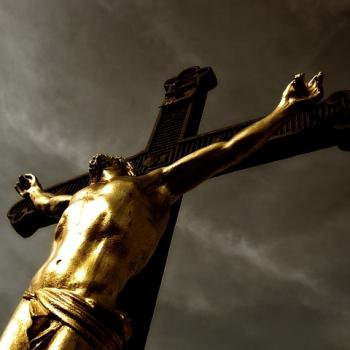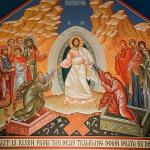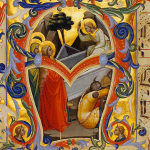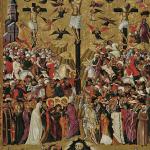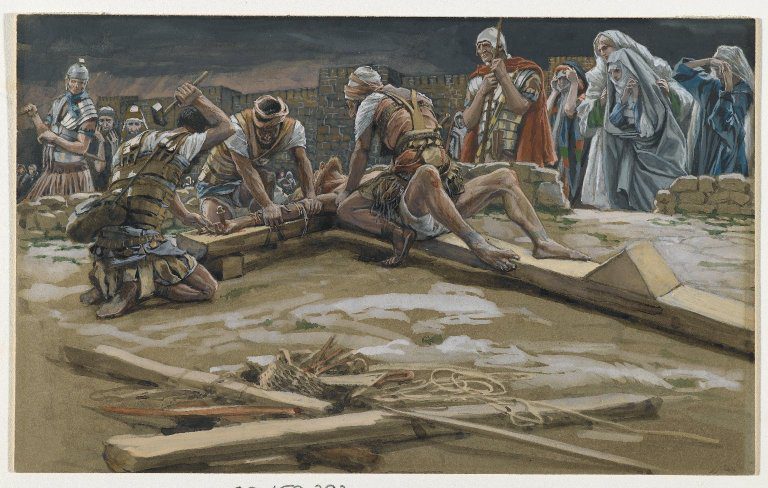
“Father, forgive them, for they know not what they do.”
What could that possibly mean?
There’s no “fat” in the Gospels. There’s nothing in there that was put in by accident. No book could contain all the words and actions Christ performed while He was among us; every word that has been recorded, has been recorded for our benefit, because it’s something we need to know. We need to know that this was the first thing Christ said, when they dislocated His shoulders and forced filthy, rusty nails through His wrists.
“Father, forgive them, for they know not what they do.”
How can that be?
How could they not know?
How can you torture a man to death and not know?
How do you become a person who tortures to death and doesn’t know?
The Romans were good at torture. Earlier that day they’d scourged Him– a long leather whip with hooks and bits of glass on the ends, ripping out bone-deep strips of skin as big across as a hand. People died regularly from Roman scourgings. It’s likely that Pilate hoped Christ would die, and solve his problem, but Christ didn’t. He held on.
The scourging had been business as usual, soldiers following orders as soldiers do. Pilate was the law, the law said “scourge Him,” and the officers of the law obeyed. The scourge wasn’t their invention and scourging a man to appease the mob wasn’t their idea.
What happened next was. They twisted a crown out of thorns and forced it on His head. Then they threw a purple robe over those fresh scourges and mocked Him. If cruelty is your job, it seems, cruelty quickly becomes a hobby. If you are cruel in the name of the emperor, for the good of the state and the sake of law and order, you will be cruel on your own time as well. If you obey the law whether the law is right or wrong, you’ll certainly become a person who does wrong for your own entertainment. Cruelty is not simply an act that one performs; it’s a disposition that takes over the soul and begets more cruelty. What begins as a duty becomes a pleasure before you even know what you’re doing.
Pilate showed Jesus to the crowd, hoping they’d be satisfied, but they were not. The crowd was cruel as well. Perhaps they weren’t cruel in their day to day life. Some of the Pharisees were hypocrites, of course, but surely the whole crowd wasn’t. Perhaps there were people there who were faithful to the whole law, most of the time– not only in what they ate and how they washed and dressed, but also in obeying the weightier commandments such as “thou shalt not kill.” It’s almost certain that the vast majority of the people in that crowd had never killed a man in their lives. Yet there they were, beholding a man on trial for nonviolent offenses who had already been tortured within an inch of His life. And they demanded that inch be taken from Him, in the most painful way imaginable. Their leaders stirred them to frenzy, preying on their zeal for the law, and they demanded cruelty for the sake of the Law. That’s how contagious cruelty is.
Pilate washed his hands of the matter, as if that could make it any less his doing. Pilate may have felt himself too genteel to be cruel like a common soldier, but he ordered acts of cruelty when the law demanded it, and permitted them when they were convenient.
And the crowd dragged Jesus away, carrying His cross Himself.
Then they nailed Him to it, and He prayed, “Father, forgive them, for they know not what they do.”
Perhaps they really don’t know.
They ought to know. They ought to feel in the depths of their souls that they’re torturing a man to death. They are nailing human flesh to wood for no other reason but to make it suffer and die. They ought to know. Their hands should shake and drop the nails. They shouldn’t be able to look at what they’re doing. They should vomit, panic, run away. They should be glad to be tortured or killed themselves for disobeying orders, rather than go through with even a part of it. That’s the normal, healthy response to being made to participate in cruelty. Perhaps they felt that way, at first, the first time they tortured a man to death or the first time they saw it done, but that was a long time ago. They saw it through. They carried out the law. They’re experts at it now. They like it.
And the Son of God cries to God, the Father with Whom He is One.
“Father, forgive them, for they know not what they do.”
They don’t know what they do.
This is the horror of sin.
The act is sickening, but there is a sense in which the act is almost beside the point. Sin is more than the terrible act of a moment. Sin is that which turns a human being into someone who loves the terrible. Sin makes good seem evil and evil good. And the more you permit yourself to sin for a reason that seems good, the more the sin becomes paramount and the reasons secondary. And then you’re completely possessed by cruelty, you’re torturing the Son of God to death, and it’s fun.
And the Son of God does not condemn you.
The Son of God lies down on the wood, not resisting, and stretches out His hands, so that you might see what you do. The Son of God cries to the Father, God to God, Light to Light, True God to True God, God in agony to God in Glory, that you don’t know what you’re doing. That He only desires for you to be forgiven and the sin be stripped away. That the sin be peeled away from your eyes and you stand there, nails and hammer in your hand, and see what you’ve become. That, once again, you would behold a human being instead of a dirty task you’ve come to enjoy because you feel it’s necessary.
That you would know what you do, and not only stop doing it, but become someone who would never think to do it.
That you would rather give yourself over to be scourged, mocked, condemned, lie down on the cross, stretch out your hands and give witness against cruelty, as the Lord did, than be cruel again yourself.
And so the Lord prayed, and we unite ourselves to the cross and pray with Him, for those soldiers thousands of years ago and for all who are like them, especially for our own selves, because we have all been guilty of cruelty. “Father, forgive them, for they know not what they do.”
(image via Wikimedia Commons)
Steel Magnificat will be meditating on the Seven Last Words of Christ on Mondays throughout Lent.








